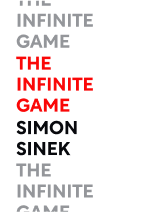

This article is an excerpt from the Shortform book guide to "The Infinite Game" by Simon Sinek. Shortform has the world's best summaries and analyses of books you should be reading.
Like this article? Sign up for a free trial here .
Looking for The Infinite Game quotes by Simon Sinek? What are some of the most noteworthy passages worth revisiting?
In The Infinite Game, Simon Sinek applies James P. Carse’s concept of finite and infinite games to the domain of business. Games where the players either play to win (finite), or to survive, thrive, and keep playing (infinite). He argues that people who view business as an infinite game are more successful, while those who aim to “win” don’t end up as well-off.
Keep reading for The Infinite Game quotes with explanations.
The Infinite Game: Quotes and Passages
In The Infinite Game, motivational speaker and bestselling author Simon Sinek explores the differences between infinite and finite games. He walks you through how to develop an infinite mindset that will put you and your organization on a path for long-term success in business. The following The Infinite Game quotes highlight some of the key themes and ideas discussed in the book.
“In the Infinite Game we accept that “being the best” is a fool’s errand and that multiple players can do well at the same time.”
In The Infinite Game, Sinek points out that infinite-minded leaders don’t aim to be the best of the best in their respective markets. They understand that topping the competition is a finite goal that won’t lead to long-term success. Instead, leaders who adopt the infinite mindset aim to maintain a competitive position in the field on a long-term basis.
“A Just Cause must be: For something—affirmative and optimistic Inclusive—open to all those who would like to contribute Service oriented—for the primary benefit of others Resilient—able to endure political, technological and cultural change Idealistic—big, bold and ultimately unachievable.”
Sinek defines a Just Cause as a specific vision of an ideal state of the future that inspires people. Your Just Cause must paint a clear picture that others can see: A promise to “improve the world” doesn’t provide enough substance or specificity to inspire people. According to Simon Sinek, a Just Cause has five elements:
- It stands for something, not against something: It’s optimistic and hopeful.
- It’s idealistic: It’s inspiring, bold, and ultimately unachievable.
- It’s inclusive: It invites and inspires others to join.
- It’s resilient: It can endure technological, cultural, political, and industry changes.
- It’s service-oriented: It’s aimed at the benefit of others.
“When leaders are willing to prioritize trust over performance, performance almost always follows.”
Sinek notes that infinite-minded leaders recognize that sometimes the best person for a job is not necessarily the highest-performing candidate. High performance is a reflection of competence, but trustworthiness is a reflection of character, and character can be a better indicator of a quality employee—one who contributes to the organization, elevates her colleagues, and helps to make everyone do their jobs better. In the long run, trust contributes to better performance.
“The best way to drive performance in an organization is to create an environment in which information can flow freely, mistakes can be highlighted and help can be offered and received.”
Sinek maintains that the foundation of excellent performance is safe, trustworthy work culture. Infinite-minded leaders show their team members that they value and trust them and must work to establish a culture in which team members trust each other.
- Listen to their concerns and take those concerns seriously: If there are ongoing issues with workplace safety or scheduling, address them. Employees must trust that you have their best interests at heart before they can trust your leadership or, by extension, your team.
- Encourage communication: Proactively establish communication protocols that allow people to voice concerns to you without repercussions. Eliminate any feelings of fear they may have about speaking up.
- Support inter-team communication: Encourage your team members to listen respectfully to each other’s concerns. You might do this through training seminars or regular meetings. Encourage them to form friendships with each other and to open up on a personal level, which can in turn help them work together on a professional level more smoothly.
- Identify high-trust team members: When hiring, it can be difficult to figure out a person’s character because it is less easily quantified than her performance is. However, on an existing team, it’s easy to identify the person everyone trusts. Make sure that person feels valued for her contributions.
- Identify low-trust members: It’s also easy to identify the low-trust team member—she’s the one everyone considers “the asshole.” Make sure this person doesn’t infect your team with toxicity. Coach her to develop better interpersonal skills. If she proves uncoachable by resisting feedback and being unwilling to change her attitude, the best course of action may be to remove her from the team.

———End of Preview———
Like what you just read? Read the rest of the world's best book summary and analysis of Simon Sinek's "The Infinite Game" at Shortform .
Here's what you'll find in our full The Infinite Game summary :
- Why businesses who see the game as finite don't survive
- How to develop an infinite mindset that will put you and your organization on a path for long-term success
- How the purpose of business is changing






